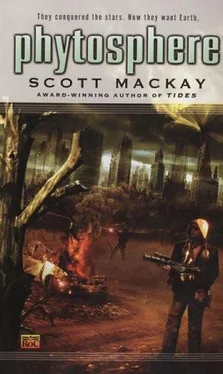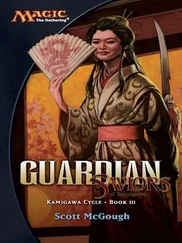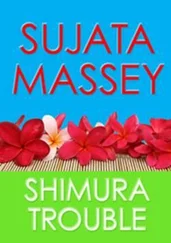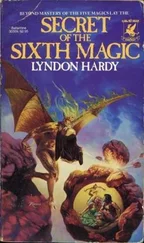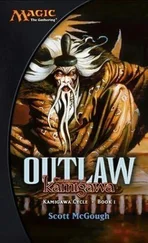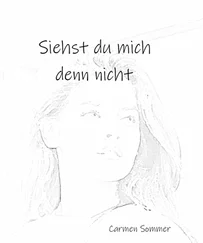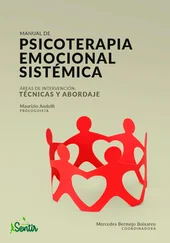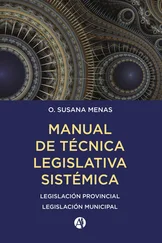“You sound a little on edge, Neil.”
“Glenda, the reason I called… and this is strictly hush-hush, and I don’t know whether you want to tell the kids or not. But the reason I called is to tell you that the United States and its allies are going to move against the TMS any day now. And early this morning I was informed by the assistant secretary of defense that if the TMS becomes unviable, the Tarsalans have vowed to take control of those planetside areas offered in the last U.N. counterproposal. That includes the Chattahoochee National Forest. So you have to be careful of your approach.”
She was silent for several seconds. “So… when you say take control…”
“It’s going to be hostile.”
Again, a pause. “Do you think they’ll get anywhere near Marblehill?”
“If they do, they’re going to get a lot more than they bargained for.”
The next day, perforations developed in the shroud’s brown freckling, and unimpeded sunlight reached the Earth’s surface. The mood at Homestead was buoyant. Neil couldn’t have been happier. All morning and into the afternoon he didn’t hear a single gunshot. The cease-fire lasted all night, and when morning came there was an actual dawn, diffuse and brown, with a light so fragile and amber that it reminded him of atmospheric varnish.
All that day, peace reigned. He spent much of the afternoon looking at his book. It was an art book, with full-color plates, and its title was The Impressionists . The Impressionists, he decided as he gazed at a particularly evocative painting by Mary Cassatt, were the great painters of light, from the great age of light, before this current age of darkness. This painting by Cassatt was called A Reader in the Garden,
and as a study in sunlight, it had a great emotional impact on Neil in his current strained circumstances.
He turned the book around and showed his wife. “You know what the caption says? It says, ‘In fresh bright light, in the middle of a flower garden, a woman sits reading.’ Look how she just takes it for granted. Not only the sunlight, but the flowers. Look at the light in this painting. Look at the shadow. And then look outside.
Melissa got up, came over, and put her arm around him. “By next summer we’ll be back home. I’ll help you put cocoa shells on the garden. We’ll have flowers just like hers.”
He patted her hand, and realized it wasn’t a girl’s hand anymore, but a woman’s.
For the rest of the afternoon and evening he looked at his book. In the title of every work, sunlight was implicit. Regatta at Argenteuil. Countryside with Haystacks. Village Along the Seine. He concentrated for a long time on Alfred Sisley’s Village Along the Seine. He read the caption. “One feels the pleasure of the painter in the sun-dappled trees in the foreground and the clear light on the houses on the other side of the river.” Painted in 1872. He wanted to be on the banks of the sunlit Seine in 1872, right there with Alfred Sisley as he painted his sun-dappled trees and clear-lighted houses.
“When this is all over, I’m going to retire.”
He woke up in the small hours of the morning drenched in a fearful sweat. A dream. A stupid dream.
The Cameron Chess Study. He and Kafis playing chess. Kafis’s pupils shrinking to their midpoint in that sneaky and aggressive way they had as he checkmated Neil. Checkmate. The word echoed in his mind.
But then he realized that at exactly this moment—and he confirmed it with a quick glance at his cordless alarm clock—the Moon was launching.
“Checkmate, Kafis,” he said into the dark that he had grown to hate.
He expected to see even more brown spots over the next couple of days—the Moon launches burning through the phytosphere the same way a lit cigarette burned through upholstery—but new spots didn’t appear. He sat in the parade ground for most of the afternoon and looked up at the sky with a pair of enhanced binoculars, military ones equipped for infrared, hoping to see some telltale activity. Not only did he fail to spot any new lesions, but the existing ones seemed to be stagnating in their growth.
He had his dwindling scientific staff keep an eye on the phytosphere for the rest of the day—many of his people had abandoned their posts, finding the growing instability at Homestead too nerve-wracking.
When the sun went down, a young Air Force technician said that there was no significant growth in the virus lesions, and that, in fact, some of them were scabbing over with what seemed on the spectrometer to be a form of carbon sheeting.
Neil had a look at the readouts, and after scrupulous analysis he realized, with a sickening sense of dread, that instead of the targeted Tarsalan DNA component responding in defense to the insult of his virus, it was actually the xenophyta carapace component that was responding, capturing and encapsulating the virus during its lytic phase, trapping the reproducing viruses in little cages of superhard material, and at the same time neutralizing the omniphages. Was this his endgame, then?
He told Colonel Greg Bard about it an hour later.
“It’s like when a computer gets a virus. If the computer can’t delete it, it quarantines it. The carapace, or at least extraneous calcifications of carapace material, are surrounding and encapsulating the virus, effectively jailing it so it can’t spread.” He shook his head, nonplussed by his own blindness. “I didn’t see it coming, Greg. I was so focused on defeating and confusing the defense component, I didn’t consider the possibility that the carapace element might pick up the slack. And now I think we’re screwed.”
The new offensive came an hour after that. He didn’t know how the opposing side got a tank, but he heard it at the other end of the base: the hum of its fusion-cell-powered engine, the creak of its tracks, and the nearly inaudible rumble of its massive weight getting closer and closer. He packed up what he could, had the girls throw clothes into bags, and as gunfire erupted in the stale brown dusk of the slowly closing virus holes, he and his family ran the two hundred yards to the Officers’ Club.
Airmen sandbagged the Officers’ Club.
Neil and his family entered and turned left. Emergency lights lit the corridors. His girls did exactly what they were supposed to, just like in the drills. Some airmen clutching rifles, led by Colonel Greg Bard, emerged from a ready room and ran down the corridor toward them, dark blue helmets on their heads, light-gathering goggles over their eyes, tramping down the hall in sync, grim-faced and intent.
Bard stopped and gave them a smile. “Hi, girls.”
The girls gave him halfhearted and frightened hellos.
Then Greg turned to Neil and offered an apologetic shrug. “Looks like they’re…you know.”
“Is it bad?”
“We knew it was coming.”
Something in the way Greg said this made Neil’s stomach roll in fear. “But you’re sure you can stop them.”
Greg looked away. “I don’t know where they got that tank.” He seemed distracted for a few seconds but then his attention focused. “And actually…I was coming over. I want to give you these.” Greg took out two aerosol spray cans. Neil instantly recognized them as the spray they used to disable Tarsalan flying surveillance macrogens, a defense-department-contract product that had been in limited use in sensitive areas for the last several years, and had recently become commercially available. “Lenny’s telling me they need some up at Marblehill.”
The implication of this overwhelmed Neil. “Why would they need some up at Marblehill?”
“Because it’s happened, Neil. Last night at about two in the morning.”
Neil felt his forehead growing moist. He took the two cans and stuffed them into his bag. “And the… the TMS?”
Читать дальше
